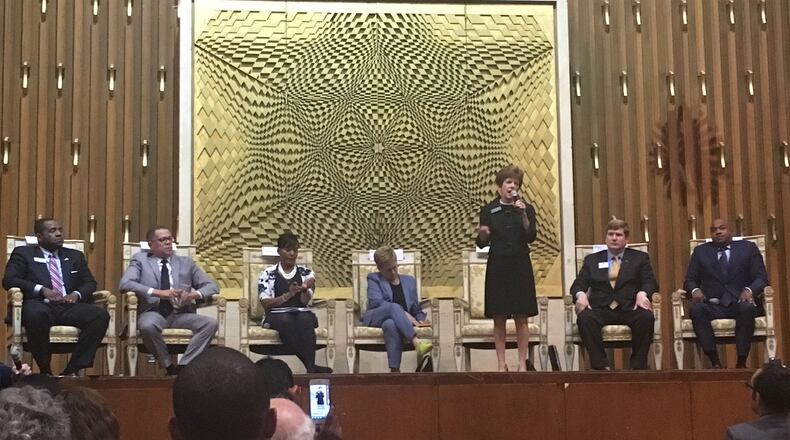Seven of the leading candidates for Atlanta mayor gathered Tuesday for a discussion about social justice and tolerance at the Ahavath Achim Synagogue.
One of the more intriguing questions posed to the candidates by moderator Bill Nigut was a simple one: Does Atlanta still live up to its famous mantra as the City To Busy To Hate?
Here are portions of their answers:
Former Atlanta chief operating officer Peter Aman: "We are not the city too busy to hate. We may be the city too busy to love. But – and I'm not the first to say this - the opposite of hate is indifference, and we have a lot of indifference in the city of Atlanta."
Councilwoman Keisha Lance Bottoms: "That's still our core value – that we are the city too busy to hate ... I watched my son sob one day, and it was shocking to me. He said, 'Mom, you just don't understand how hard it is to be a black boy now.' And it breaks my heart. We have to acknowledge it and confront we still have issues about who we are in this country, and then we can truly be the city too busy to hate."
Former Fulton County chairman John Eaves: "Let's be honest. It's a slogan. It's not a way of life. If you look at our city there's a fault line from north to south. Our houses of worship are segregated on Saturdays and Sundays, to a lesser extent ... We have a separate but unequal school system ... I have a long history of bringing people together."
Councilman Kwanza Hall: "Atlanta is good at building buildings but not as good at loving each other ... The way forward really is we have to break up the way we bid. Some people call it the status quo. The next mayor of the city has to be the type of person who brings people together."
Council President Ceasar Mitchell: "I am still hopeful for our city. I learned from my grandmother the greatest way to love is to serve others. ... The best way to eradicate hate is to show love, and the best way to love is to serve. And I believe that's the best way to serve our city. We're going to find a pathway to love through service."
Councilwoman Mary Norwood: "When I'm out in the neighborhoods, I see people getting along wonderfully – people who are very diverse ... but what gets in our way is power and money. Who has it, who wants it ... Race is framing this. But we as Atlantans are better than this. And what I see every day is people in Atlanta crossing lines, crossing artificial barriers, working together.
Former City Council President Cathy Woolard: "We are sometimes the city too busy to commit. We are studious about being black or white or Christian or Jewish. But when it comes to being the city on the front lines ... we aren't often first. We'll get there. But we are rarely first. But when we had religious exemption bills, it took three years for our business community to arrive."
About the Author
The Latest
Featured




